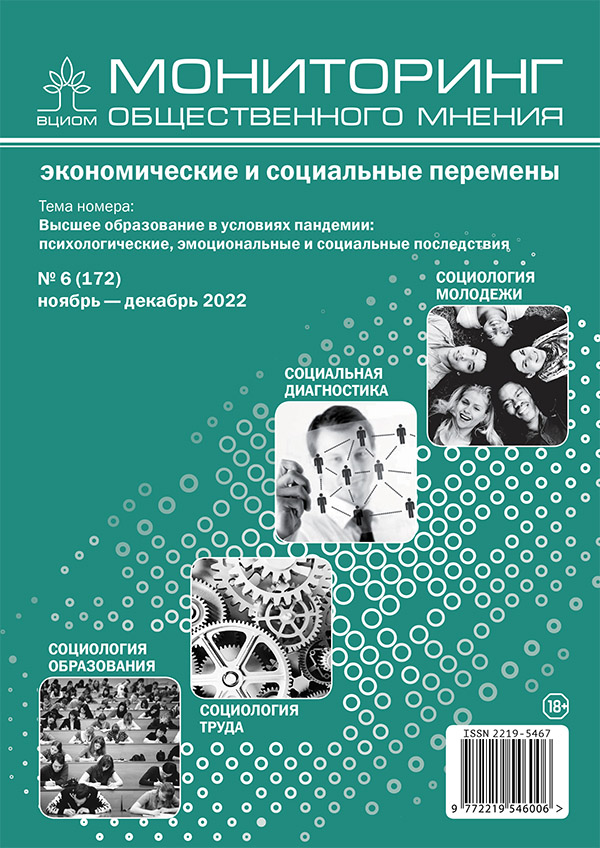От обучения в пандемию к обучению пандемии: копинг-стратегии в официальных материалах ведущих российских и мировых университетов
DOI:
https://doi.org/10.14515/monitoring.2022.6.2280Ключевые слова:
пандемия, университет, высшее образование, идентичность, дискурс-анализАннотация
Продолжающаяся пандемия COVID-19 стала серьезным испытанием для различных аспектов системы высшего образования. Однако не столь очевидно, в каких аспектах влияние пандемии вызвало появление принципиально новых феноменов, в каких — усилило уже намечавшиеся процессы (например, цифровизацию), а в каких, наоборот, закрепило давно существовавшие способы действия, замедлив намечавшиеся изменения. Дифференциация этих трех категорий — цель данного исследования. Для ее реализации был проведен дискурс-анализ посвященных пандемии COVID-19 материалов, размещенных на сайтах 100 ведущих российских университетов по рейтингу Forbes и 100 ведущих мировых университетов по рейтингу Times Higher Education.
Полученные результаты указывают на то, что доминирующей копинг-стратегией на всем протяжении пандемии стало обращение к университетской коллективной идентичности. На ранней стадии пандемии эта копинг-стратегия приняла форму эмоционального обращения к образу сообщества конкретного университета как ресурсу взаимной поддержки, основанной на взаимопонимании и общей интерпретации происходящего. В отдельных случаях не только эта общая копинг-стратегия, но и конкретные копинг-техники, которые эксплицитно предлагались обучающимся и сотрудникам университета, встраивались в уже сформированную к тому времени идентичность университета с ее символическими атрибутами и содержательными характеристиками. По мере того как пандемия становилась новой реальностью и наращивала собственную историю, на смену этой эмоционально насыщенной актуализации идентичности конкретного университета пришла подчеркнуто академическая, эмоционально отстраненная рефлексия относительно изменений, которые пандемия вызвала в университете и в системе высшего образования в целом. Таким образом, на смену обучению в условиях пандемии приходит обучение пандемии, причем оба явления связаны с укреплением коллективных идентичностей как отдельных университетов, так и высшего образования как социального института, в противоположность дискурсу о его кризисе, характерному для допандемического времени.
Благодарность. Исследование выполнено в рамках Программы фундаментальных исследований НИУ ВШЭ.
Загрузки
Опубликован
Как цитировать
Выпуск
Раздел
Лицензия
Copyright (c) 2022 Мониторинг общественного мнения: экономические и социальные перемены

Это произведение доступно по лицензии Creative Commons «Attribution-NonCommercial-ShareAlike» («Атрибуция — Некоммерческое использование — На тех же условиях») 4.0 Всемирная.






